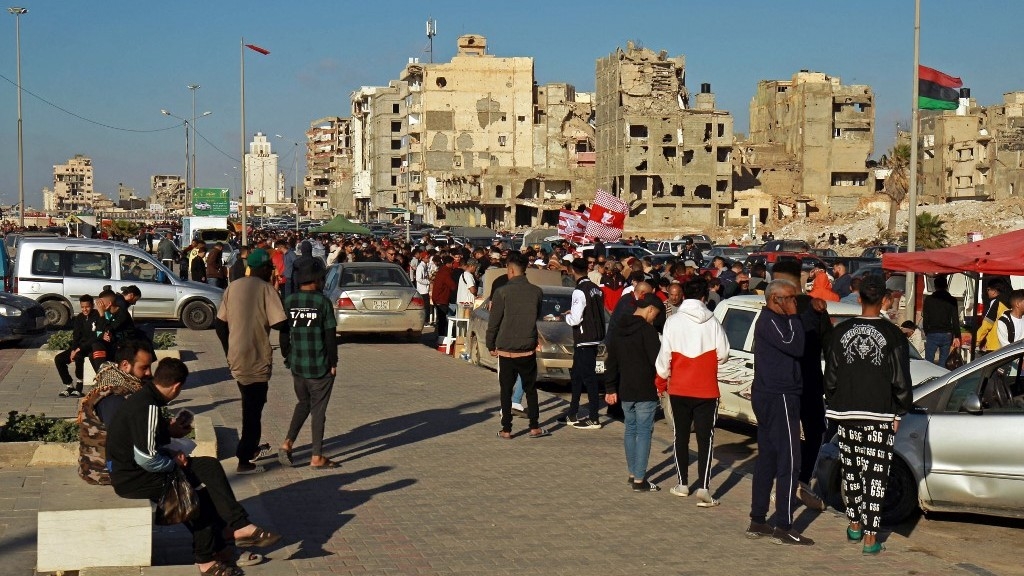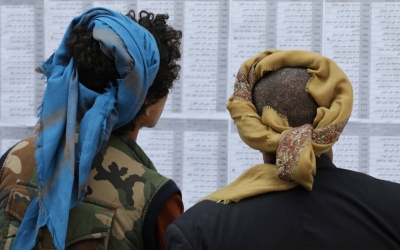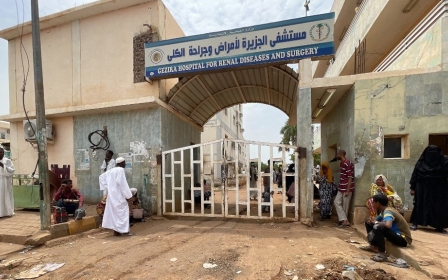Arabic press review: Tens of thousands of Libyans expelled from their homes

Libyans expelled from homes by Haftar
A new report by UN experts states that over 20,000 people from the city of Benghazi in Libya were forced to evacuate their homes within a short space of time.
According to the London-based al-Quds al-Arabi newspaper, the residents were forced to give up their properties and documents to brigades affiliated with General Khalifa Haftar.
The report urged Haftar’s forces to immediately stop the forced evacuations of residents and the demolition of homes, and to put an end to reprisals and violence against demonstrators.
The experts stated that there were no prior consultations with the residents before they were ordered to evacuate their homes, meaning that they were also not compensated.
New MEE newsletter: Jerusalem Dispatch
Sign up to get the latest insights and analysis on Israel-Palestine, alongside Turkey Unpacked and other MEE newsletters
Residents have been left without any assistance to obtain secure housing, leaving many of them scrambling to find somewhere else to stay, or temporary accommodation.
The UN experts have also raised concerns over the mistreatment and arbitrary arrests facing demonstrators, along with human rights defenders and those who are speaking out against the forced evictions.
Among the concerns expressed in the report are that demolitions in Benghazi are also causing irreparable damage to archaeological and historical sites.
Yemenis forced to forgo meals
Deteriorating economic conditions in Yemen are forcing many families to skip meals and reduce their portion sizes as the price of goods skyrockets.
According to a report in the al-Araby al-Jadeed newspaper, families are now not only skipping meat and poultry, but are also struggling to afford other foods such as fruits, vegetables, legumes, rice and dairy products.
People who spoke to the newspaper said they are being forced to have one collective meal a day, in the middle of the day. Typically, this consists of flour mixed with water and milk.
The United Nations World Food Programme estimates that food insecurity in Yemen has reached approximately 50 percent of the population, with an increasing number of families unable to meet their food needs.
Saber al-Shawafi, who lives in the capital, Sanaa, is one of a family of six who have been heavily hit by the rise in prices of basic items. Shawafi said that even those who are employed full time can’t afford to buy medicine, bread or pay their rent and bills.
Economic researchers who spoke to al-Araby al-Jadeed said the impact was made worse due to the salaries of civil servants no longer being paid, which were a lifeline for many families.
Funding cuts for Jordanian refugees
Refugees in Jordan will be facing a cut in funding of around 60 percent, according to Jordanian newspaper al-Ghad.
The UN High Commissioner for Refugees (UNHCR) has raised concerns over the several consecutive cuts of funding for refugees in the country.
'The current lack of funding for the refugee response is undermining the great achievements made in over a decade'
– Dominik Bartsch, UNHCR
“The current lack of funding for the refugee response is undermining the great achievements made in over a decade,” warned Dominik Bartsch, UNHCR representative in Jordan.
The funding cuts come at a time when the World Food Programme has also had to reduce the value of its monthly food assistance for refugees in Jordan’s refugee camps from 23 to 15 Jordanian dinars ($32/$21).
With many refugees already in a vulnerable position, the cuts are set to make life increasingly difficult.
According to the UNHCR, the number of refugee families who cannot pay their rent and are at risk of eviction from their homes rose by 66 percent from December 2022 to February 2023.
* Arabic press review is a digest of news reports not independently verified as accurate by Middle East Eye.
Middle East Eye delivers independent and unrivalled coverage and analysis of the Middle East, North Africa and beyond. To learn more about republishing this content and the associated fees, please fill out this form. More about MEE can be found here.





